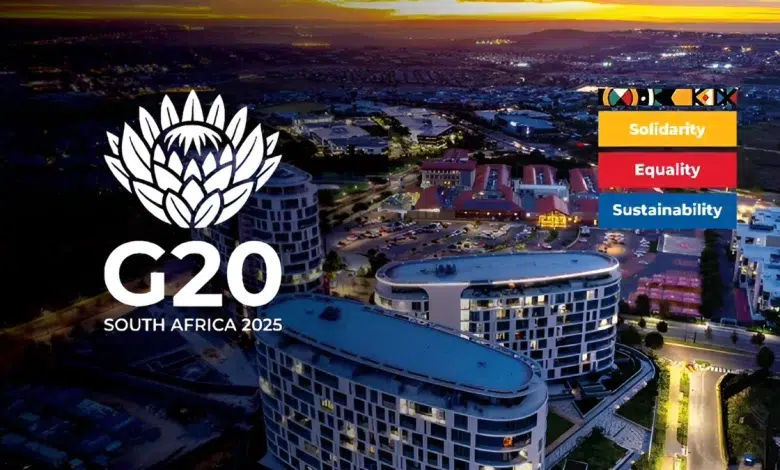G20 Summit Build-Up Drives R21 Billion Domestic Spending in Gauteng

Table of contents
- Gauteng’s Economic Surge Ahead of the G20 Summit in November 2025
- Economic Impact of G20 Preparations in Gauteng
- Supporting Small and Medium Enterprises (SMMEs)
- Boost to Tourism and Hospitality Sectors
- Broader Economic and Social Impacts
- Addressing Challenges and Strategic Management
- G20 Summit and Long-Term Legacy
Gauteng’s Economic Surge Ahead of the G20 Summit in November 2025
As Gauteng prepares to host the highly anticipated G20 Summit in November 2025, the province is already witnessing substantial economic growth. Reports show that domestic spending in Gauteng has surged to approximately R21 billion. This highlights the wide-ranging economic benefits of the event’s preparations. This surge reflects how the G20 Summit is stimulating local businesses, industries, and communities. It reinforces Gauteng’s position as a key player in both South Africa’s and the global economic landscape.

Gauteng’s tourism sector is more than just sights and sounds – it’s a powerhouse for the economy. In 2024, it injected R41 billion into the GDP and boosted local SMMEs with R19 million in support. Discover how tourism is shaping Gauteng’s future.
Economic Impact of G20 Preparations in Gauteng
Gauteng’s MEC for Economic Development, Lebogang Maile, revealed in August 2025 that domestic spending in the province had reached R21 billion in the lead-up to the G20 Summit. This notable increase is largely attributed to heightened business activity surrounding event infrastructure, hospitality, tourism, security services, and transport.
The build-up to the summit has involved substantial investments in venue preparations, accommodation upgrades, transport logistics, and security systems. This increased demand across sectors has generated job opportunities. It has also created a wealth of supplier contracts, all contributing to the economic uplift of Gauteng.
Supporting Small and Medium Enterprises (SMMEs)
A key highlight of the G20 Summit’s economic impact is the support it provides to small and medium enterprises (SMMEs). These businesses, which form the backbone of Gauteng’s economy, have received a significant portion of the R21 billion surge. Through the summit’s procurement processes, local suppliers have been prioritized, promoting inclusivity and fostering sustainable economic growth.
This initiative aligns with Gauteng’s broader economic development strategy, which focuses on empowering local entrepreneurs, particularly those operating in townships. SMMEs involved in sectors such as catering, event management, transport, and accommodation have seen increased visibility. Additionally, they have secured contracts that extend well beyond the summit. This ensures long-term business growth.
Boost to Tourism and Hospitality Sectors
Alongside the direct economic impact of the G20 preparations, Gauteng’s tourism and hospitality sectors have experienced significant growth. The expected influx of international delegates, media personnel, support staff, and visitors has led to increased bookings at hotels. It has also resulted in more foot traffic in restaurants and heightened demand for transport services.
Air travel capacity recovery has been solid for South Africa. Currently, we have active international routes connecting 72 cities worldwide, serviced by 55 airlines, offering over 7.8 million seats across over 52 000 flights. On the domestic front, our capacity has rebounded with 18 million seats for 2024, and 4.2 million seats already projected for the first quarter of 2025.
Experts predict that the G20 Summit will bolster Gauteng’s reputation as a premier global destination for business events. While the immediate economic gains are evident, the long-term benefits for Gauteng’s tourism industry are also substantial. The summit’s international exposure is expected to result in sustained tourism growth well beyond 2025.
Broader Economic and Social Impacts
The G20 Summit’s impact extends beyond the financial sphere. It promotes social cohesion, facilitates international partnerships, and fosters skills development. Various training programmes have been launched to equip local workers with the skills needed for event management, customer service, and security.
In addition to boosting skills and capabilities, the G20 Summit presents an invaluable platform for showcasing South Africa’s economic potential on the world stage. Gauteng’s participation will enhance investment opportunities across key sectors such as manufacturing, mining, trade, and services. By positioning South Africa as a regional leader, the summit is expected to drive further growth and development in the years to come.
Addressing Challenges and Strategic Management
While the economic benefits are undeniable, managing the complexities of hosting a global event such as the G20 Summit presents several challenges. Effective coordination between the government and private sector is essential to ensure that infrastructure is delivered on time. Security measures must be well-executed, and service quality should remain high throughout the event.
Sustainability is another critical consideration. Plans are in place to reduce the environmental impact of the summit. Moreover, practices that promote inclusive growth will benefit all sectors of society. These efforts will ensure that Gauteng’s hosting of the G20 Summit leaves a lasting, positive legacy for both the province and South Africa as a whole.
G20 Summit and Long-Term Legacy
Scheduled for 22–23 November 2025, the G20 Summit in Johannesburg is expected to attract over 40 heads of state and thousands of delegates. This international attention will significantly raise Gauteng’s profile on the global stage. It will strengthen South Africa’s economic ties and enhance its diplomatic relations worldwide.
Preparations for the G20 Summit will continue to drive domestic spending, create jobs, and expand economic opportunities across multiple sectors. The legacy of this event will not only be seen in immediate economic growth. It will also be evident in the lasting benefits aligned with South Africa’s broader development goals, particularly the G20’s core themes of solidarity, equality, and sustainability.




